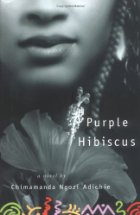ARC Review #2 - Purple Hibiscus, Adichie
 Country: Nigeria, West AfricaAuthor: Chimamanda Ngozi Adichie Review: Perhaps it's typical of novels from the African and Caribbean diaspora, but I find often that authors' first novels are coming-of-age stories. (It's one of the things that's turned me off reading novels from my own region, and equally, what's stopped me writing The Big One.) But that's an aside; I'm here to talk about Adichie's first novel, Purple Hibiscus.So all right, it's a coming-of-age story. But it didn't turn me off! On the contrary, it's so well done, so carefully drawn, so non-solipsistic that it won me over.The narrator is a fourteen-year-old girl whose father is a Big Man in her community -- owner of a local factory, publisher of the only newspaper that dares to be critical of the government, fierce Roman Catholic convert, pillar of the community, a local hero who (like Achebe's Okonkwo) cannot bend but must break, or be broken, instead. The father is a domestic tyrant who teaches his lessons with pain, who punishes his family with specific physical torments, and who has no tolerance for anything other than the way he has chosen for himself. He is distanced from his own father, who has refused to abandon his traditions, and has an uneasy relationship with his sister, who has made peace with both the old way and the new, and is able to chart a specifically African course, balancing her life between the traditional and the contemporary, and finding a very Nigerian interpretation of Christianity. The narrator and her brother live sheltered lives until they go to visit this aunt, a poor professor in a university town, and their experiences with her and her family form the catalyst that brings the story to its turning point.Adichie's style is spare and clean (is this a 21st century phenomenon?), and deceptively simple. It's in keeping, in its female, 21st century way, with the trend Achebe set with Things Fall Apart, limpid language revealing subtext. And the subtext is rich: domestic abuse, the challenges of living in independent Nigeria, the challenges of remaining uncorrupted, the poverty and marginalization of intellectuals, the casual violence of everyday life. From the fervent church services and the generosity of the father to the poor to the scar on Kevin-the-chauffeur's neck and the polishing of the mother's figurines, the gulf between the public persona and the private life is too large to be crossed, until.Comments: I ran across Adichie on Zoetrope and am glad I finally read her book. I'd read more by her for sure.
Country: Nigeria, West AfricaAuthor: Chimamanda Ngozi Adichie Review: Perhaps it's typical of novels from the African and Caribbean diaspora, but I find often that authors' first novels are coming-of-age stories. (It's one of the things that's turned me off reading novels from my own region, and equally, what's stopped me writing The Big One.) But that's an aside; I'm here to talk about Adichie's first novel, Purple Hibiscus.So all right, it's a coming-of-age story. But it didn't turn me off! On the contrary, it's so well done, so carefully drawn, so non-solipsistic that it won me over.The narrator is a fourteen-year-old girl whose father is a Big Man in her community -- owner of a local factory, publisher of the only newspaper that dares to be critical of the government, fierce Roman Catholic convert, pillar of the community, a local hero who (like Achebe's Okonkwo) cannot bend but must break, or be broken, instead. The father is a domestic tyrant who teaches his lessons with pain, who punishes his family with specific physical torments, and who has no tolerance for anything other than the way he has chosen for himself. He is distanced from his own father, who has refused to abandon his traditions, and has an uneasy relationship with his sister, who has made peace with both the old way and the new, and is able to chart a specifically African course, balancing her life between the traditional and the contemporary, and finding a very Nigerian interpretation of Christianity. The narrator and her brother live sheltered lives until they go to visit this aunt, a poor professor in a university town, and their experiences with her and her family form the catalyst that brings the story to its turning point.Adichie's style is spare and clean (is this a 21st century phenomenon?), and deceptively simple. It's in keeping, in its female, 21st century way, with the trend Achebe set with Things Fall Apart, limpid language revealing subtext. And the subtext is rich: domestic abuse, the challenges of living in independent Nigeria, the challenges of remaining uncorrupted, the poverty and marginalization of intellectuals, the casual violence of everyday life. From the fervent church services and the generosity of the father to the poor to the scar on Kevin-the-chauffeur's neck and the polishing of the mother's figurines, the gulf between the public persona and the private life is too large to be crossed, until.Comments: I ran across Adichie on Zoetrope and am glad I finally read her book. I'd read more by her for sure.